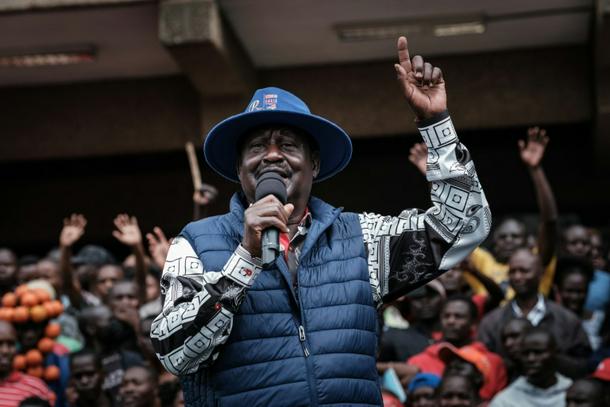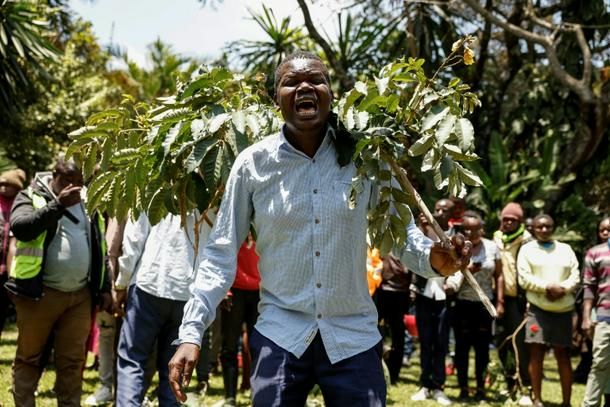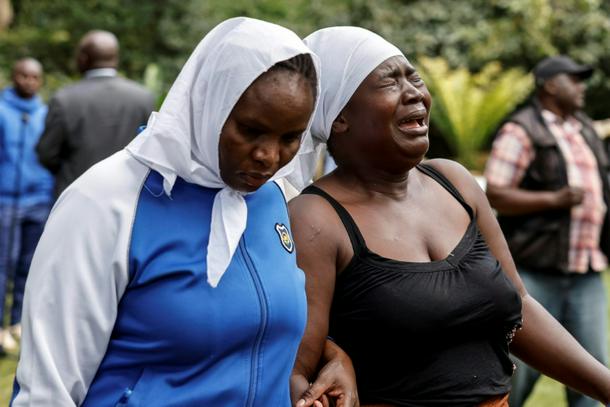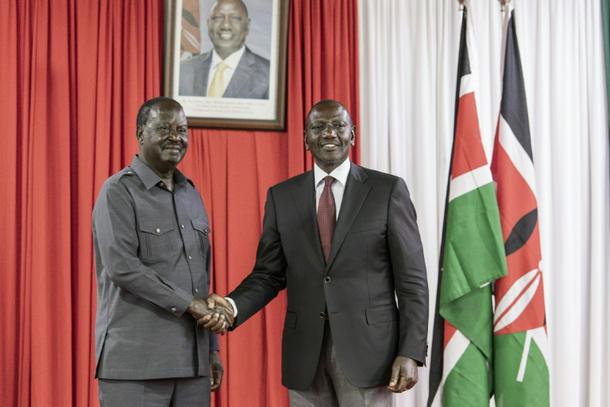
Raila Odinga, who has died at the age of 80, ran unsuccessfully for president of Kenya five times
Nairobi (AFP) - Kenyan opposition leader Raila Odinga, a “towering statesman” over decades of upheaval, died at the age of 80 on Wednesday during a health visit to India – a political earthquake that leaves the east African nation on an uncertain path.
Emotional scenes of mourning broke out across Kenya for its perennial opposition figure, who ran unsuccessfully for the presidency five times, most recently in 2022.
Hundreds gathered at his residence in Nairobi, many visibly in shock and holding branches, a symbolic gesture of respect, with some screaming “Baba” (father), as Odinga was widely known.
Indian police told AFP he was walking with his sister, daughter and a personal doctor at an Ayurvedic clinic in Kerala state “when he suddenly collapsed”.

Mourners flooded the streets in many parts of Kenya
President William Ruto declared seven days of national mourning and a state funeral, calling Odinga “Kenya’s foremost statesman and one of Africa’s greatest sons”.
According to the autopsy, Odinga’s brother indicated a heart attack was the likely cause of death.
The body was set for repatriation Thursday to Kenya ahead of a state funeral service on Sunday.
Odinga was at the centre of political developments since the 1990s and had remained a dominant force, able to rally huge numbers.
“How are we going to survive without him? We are shaking,” Anima Ferrari, his head of protocol, told AFP in tears at Odinga’s residence.
- ‘Hero’ -
Born on January 7, 1945, the son of Kenya’s first vice president, Odinga spent his early political years either in jail or exile, fighting for democracy during the autocratic rule of president Daniel arap Moi.
A member of the Luo tribe, he entered parliament in 1992 and ran unsuccessfully for the presidency in 1997, 2007, 2013, 2017 and 2022, claiming to have been cheated of victory in the last four elections.
The biggest unrest came after the 2007 election, considered deeply flawed by independent observers, that triggered ethnic violence in which more than 1,100 people died.
Odinga was prime minister from 2008 to 2013 in a power-sharing deal aimed at curbing the violence, though the post was later abolished under a new constitution.
“He is my hero. He has been trying to get proper leadership for this country, but because of malpractices in our elections, he never made it,” said Ismael Ondego, 42, among the mourners at his residence.
- Vacuum -
His death leaves a leadership vacuum in the opposition, with no obvious successor who can match his ability to mobilise as Kenya heads into a potentially volatile election in 2027.

The death leaves a leadership vacuum in the opposition
“The country loses one of its most influential political players. He had a broad national appeal. None of this can be said of anyone else,” political analyst Barrack Muluka told AFP.
Odinga’s popularity dipped in recent years as ill-health and age weakened his famed speaking abilities.
His decision to ally with rivals – then-president Uhuru Kenyatta in 2018 and current president Ruto last year – were unpopular with some supporters and left the country without an effective opposition.
Since Odinga almost single-handedly drove the political alliance with Ruto, it is now “dead and buried”, Muluka told AFP, leaving Kenyan politics on an uncertain path.
“It is going to become difficult for William Ruto to get the support that Raila could have rendered him in his strongholds,” Kaburu Kinoti, who worked on Odinga’s 2022 campaign, told AFP.
- ‘Courage, resilience’ -

Odinga forged an alliance with President William Ruto that left the country without a clear opposition
Indian Prime Minister Narendra Modi said on X that Odinga was “a towering statesman and a cherished friend of India”.
A spokesman for the Sreedhareeyam Ayurvedic Eye Hospital and Research Centre in Kerala said Odinga had experienced “breathing difficulties and collapsed”.
“He was provided CPR on the spot and having seen some sign of recovery, he was rushed to the nearest modern hospital. Despite repeated efforts by the medics, his condition deteriorated and the doctors were unable to save him,” the spokesman said.
African Union chair Mahmoud Ali Youssouf posted that he “inspired generations of leaders, including myself… through his courage, resilience and unwavering belief in the power of dialogue and democratic institutions”.
burs-er/cw/giv